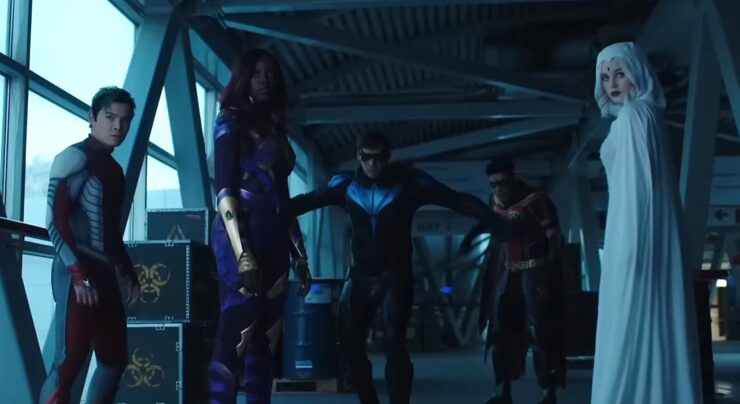After four seasons of very little fanfare, some controversy, and the best supersuits on screen, Titans has come to an end. The show’s conclusion feels anti-climactic—diegetically, everything ends with an intimate dinner among the team where they bid one another farewell and go their separate ways; in the real world, it simply feels like not enough people watched this show and gave it the love it deserved. We can’t blame viewers. Titans began its life on DC Universe, a new platform available only in the US, and the show’s move to HBO Max didn’t garner it much international reach for the same reason. But Titans does live on in streaming, and hopefully that will be its legacy.
There were always signs that the show would struggle. Titans started off on the wrong foot—remember the whole “F**k Batman” debacle? That was in the very first trailer and it was all that anyone who cared about the show, and the characters they were based on, could talk about. Why would Dick Grayson, Robin, Boy Wonder, and generally beloved comic book superhero swear and disrespect his own mentor? Well, Titans tried its best to explain that; and then it got better.
I was stoked for this series; I don’t think I had ever been this giddy about anything, let alone a TV show, but my excitement knew no bounds. That was till I watched the premiere. “F**k Batman” was the least of the show’s problems as I watched the writers turn Dick Grayson (Brenton Thwaites) from charming hero into… well, a dick. They ignored the two characters played by actors of colour, Ryan Potter’s Garfield Logan/Beast Boy and Anna Diop’s Kory Anders/Starfire, and there was this ominous, seedy threat of peril and attempted gendered violence following child character Rachel Roth/Raven (Teagan Croft). The second episode was somehow worse, as Dick found the closest woman in his vicinity, Dawn Granger/Dove (Minka Kelly), and tried to dump Rachel on her even though Rachel was Dick’s responsibility. The first three episodes of Titans season one were dark, gory, cliché and felt nothing like the Titans comics. The backdoor pilot for Doom Patrol in episode four appeared to muddy the waters even further.
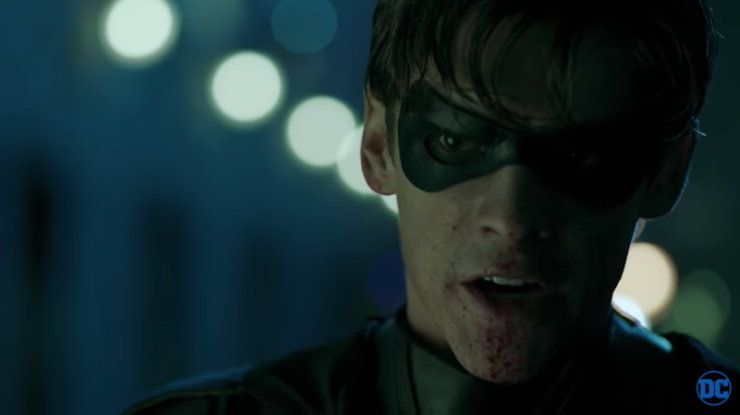
My heart sank, my dreams of seeing this long-awaited adaptation decimated with each passing episode, but hope was in the offing. The fifth episode, “Together,” brought the four main characters together and the tone completely changed after that. Where the first few episodes were disjointed and unnecessarily edgy, the rest of the season embodied cohesiveness and ease now that Dick, Kory, Rachel, and Gar were united. Titans slowly clawed its way back to being entertaining and fun, despite sticking with a generally dark and gory tone. It hasn’t been perfect, but the show made strides, especially with representation, that I worry we won’t see enough of in the superhero landscape for some time.
Each season introduced a host of characters, heroes and villains, from the comics. Season one was all about preventing the arrival of the interdimensional demon Trigon, Rachel’s father. Season two had the team contending with an old foe, Slade Wilson/Deathstroke (Esai Morales). Season three took the team to Gotham, where they fought Jason Todd/Red Hood (Curran Walters) and Dr. Jonathan Crane/Scarecrow (Vincent Kartheiser). The last season was all about the Church of Blood, an offshoot of The Organisation that tried to bring back Trigon. Each season showed growth for the characters and in the writing—season four, in fact, was the show’s most cohesive, which makes Titans’ cancellation all the more tragic.
Buy the Book
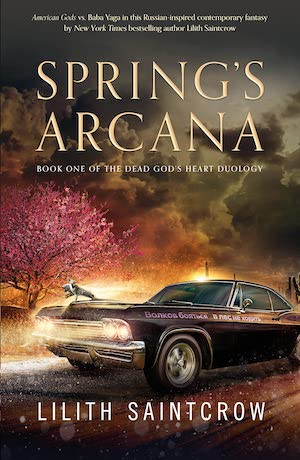

Spring’s Arcana
What the writers did well was to mostly avoid recycling familiar comic arcs, giving the show a refreshing feel. They couldn’t, however, skip the most renowned (notorious?) Teen Titans arc, “The Judas Contract,” but they deftly wove the beats of the source material into the second season’s storyline and swapped the main victim from Gar Logan to Jason Todd. And unlike in the comic book arc where adult Slade Wilson was in bed with underaged Tara Markov/Terra, there was no pedophilia in the show’s storyline. Though Gar got the short shrift and Jason stole the season.
The show didn’t really hit its stride till season three, and a lot of that was down to the creators putting off Dick’s transformation from Robin to Nightwing. Because Dick is so much older in the series versus his comic book counterpart, they had to come up with a better excuse for Dick turning into Nightwing other than “daddy doesn’t love me, and he’s found a new son.” It’s a bind the showrunners found themselves in because Bruce Wayne/Batman was off-limits in the first season. I’ll never quite understand why Warner Bros. hamstrings its own productions by banning the use of certain characters, but I guess they have to make these decisions because otherwise we’ll have 1000 shows and films about Batman, like we do in the comics, while the rest of the DC Comics pantheon is ignored.
But the problem is, Bruce Wayne is the reason Dick Grayson exists. Dick is his ward, his sidekick, his son; their relationship is key to who Dick is. Without that foundational connection, Titans struggled to figure out what made Dick tick. And they ended up going against what Batman stands for—while we never see it, Dick believes that Batman is a killer, and that makes Robin a killer. Dick hates the childhood he had with Bruce as his father figure. Season one was an overwrought mess when it came to Dick as a person because the show didn’t understand what Bruce and Dick are in the comics, and why people loved (and still love) the Dynamic Duo. They don’t hate each other, they love each other, but they’re also two very different people who are brought together under horrible circumstances, so of course they’ll grate against one another.
And once Bruce Wayne was introduced on the show, Dick’s animosity towards him made even less sense. In season two, Iain Glen stepped into the polished shoes of Gotham’s richest man, and nothing about his take on the character screamed raging murderous psychopath. Glen’s Bruce Wayne was a dapper gentleman, a senior James Bond-style fellow, whose affection for Dick, and later Jason, couldn’t be hidden. Despite an entire season of watching Dick hate Bruce, the moment Bruce stepped into the spotlight, the two patched things up in a jiffy, because what else can you do when you cast someone who looks like a kindly grandpa?
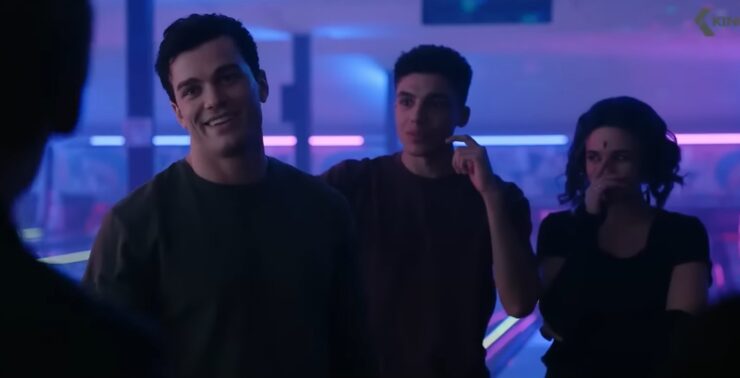
I have loved Dick Grayson since I was a child—my introduction was through Burt Ward’s youthful iteration. Later, I was taken in by the rebellious charm of Chris O’Donnell’s version in the Joel Schumacher films. I have followed Dick’s exploits across comic series. Seeing Dick back in live-action was Titans’ biggest pull for me. The casting of Brenton Thwaites made sense to me because he’s a safe bet; has the easygoing personality and good looks that befit an actor playing Dick. And, when he’s given the chance, he can flash a winning smile and carries a jovial air that embodies Dick in the comics. The first time we got to see an inkling of the happy comic book character was in season one’s “Donna Troy,” when Dick teams up with his old teammate, former Wonder Girl (Conor Leslie), on a mission. We’ve seen snippets of that cheerful Dick over the seasons, but not enough. For the most part, though, Dick was stuck fighting his inner demons, and oftentimes his own teammates.
I had hoped but didn’t expect the showrunners to cast someone of Romani heritage because most people love to ignore that aspect of Dick’s comic book history. It wasn’t until Titans season four, in “Game Over” that the show addressed his heritage. When speaking to a mystic, Dick, almost reluctantly, speaks a line of dialogue in his native language, and that’s it. But at least the show finally acknowledged this part of Dick’s history. For some reason, the showrunners decided Dick was a bad leader—or rather we were told he was a bad leader by his ex-girlfriend Dawn Granger. Aside from some poor decisions in the first few episodes of Titans (when he was a solo hero), Dick didn’t come across as a poor leader, and the writing is to blame for that. Dick’s supposed lack of leadership skills caused a lot of strife within the Titans, sometimes unnecessarily so, and it affected Dick’s personality. He’s not the same character as the one in the comics, especially not in the first two seasons, which was disappointing. Once Dawn and her constant judgement on Dick’s leadership left the team, we could feel the burden lift from Dick’s shoulders and the team certainly gelled much better since Dick didn’t second guess himself. The dynamic between Dick and Dawn did neither character any justice–and since Dick thrived after Dawn’s departure, you can’t help but wonder if Dawn was written as holding him back from greatness.
The other missing aspect was the agility and acrobatics that Dick in the comics is known for. Dick grew up in the circus and was part of the Flying Graysons, his comic book raison d’etre are his gymnastic skills. But Thwaites and the Titans stunt team hardly ever employed any of the energetic, athletic moves that are essential to Dick’s characterization. Titans, in fact, tried to veer away from action scenes as much as possible. Thwaites rarely donned his Nightwing costume in season four.
After a rocky, unnecessarily violent start, Titans showed its true colors; this was a show that wanted to subvert our expectations. The show had added Dawn Granger and Hank Hall/Hawk (Alan Ritchson) to the cast, and their initial introduction on the show seemed to be as part of a love triangle—Dick being the other man intruding on the couple’s romance. But in “Hank and Dawn,” we saw another side to these characters, one where Hank dealt with childhood abuse from his sports coach, and the two characters bonded over their shared grief over lost loved ones. The episode focused on the emotional turmoil of the characters and established why Hank and Dawn are together despite no longer being compatible. The show continued to subvert tropes in season two when Hank was the one who happily hung up his cape for a life of domestic duties, while Dawn snuck out at night to stop bad guys.
Titans worked hard on casting a diverse group of actors, and that’s commendable. Yes, the bar is set very low in Hollywood, especially in genre properties, so even a little inclusivity in a show based on existing source material challenges the status quo. Beast Boy in the comics has canonically been white; giving part-Japanese actor Ryan Potter the role didn’t change anything significant, but it added representation where we have had little. Potter thrived in the role, even though he was given so little to do. This version of Gar Logan is the only one that I can stand. He is such an annoying, sexist character in the comics; I was worried about him making the jump to live-action, but Gar is wonderful on the show. Despite the creators’ attempts to shove Gar and Rachel into a romance early in the first season—which is comic-accurate, but Croft was underage at the time and it would have been gross and illegal—Gar is really the heart of the team. He loves wholeheartedly and befriends everyone. Despite Jason being a bad boy who breaks the rules in season two, Gar is on tenterhooks till his friend comes back from being captured by Deathstroke. In season three, even when the team learns about Jason becoming the murderous villain Red Hood, Gar still believes his friend can be redeemed. And in the final season, Gar is most heart-broken when his new friend Conner Kent/Superboy (Joshua Orpin) decides to embrace his evil father Lex Luthor’s (Titus Welliver) ways. Potter brought an exuberance and range of emotion to the role that made me actually like Gar.
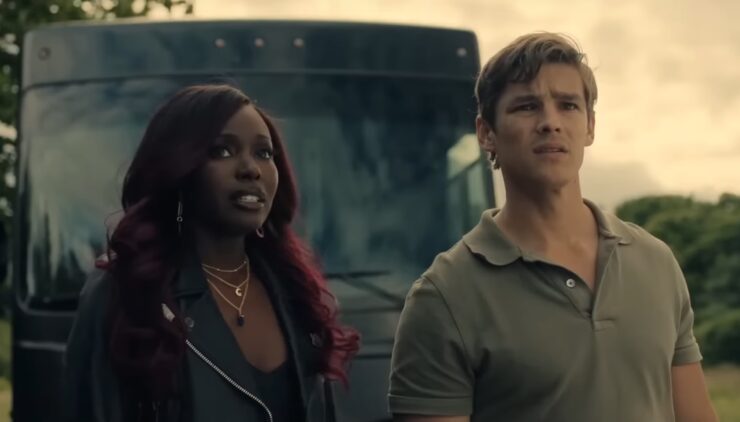
One of the early controversies surrounding the show was the casting of Anna Diop as Starfire. Starfire is an orange alien in the comics, anyone could play her. But the racists came out of the woodwork to complain about a Black actress taking on the role. Diop isn’t the first actor to face this issue—Candice Patton has been fighting racist vitriol about her playing the canonically white character Iris West on the CW’s The Flash. But hate can only get you so far. Diop has been a star on Titans; her take on Kory Anders/Starfire is a far cry from what the character has been put through in the comics—Kory isn’t a former slave from Tamaran, she’s a warrior, finding herself and her place on Earth. She’s not an overly sexualized love interest for Dick Grayson, she’s a key player in the story, a leader of the team, and Dick’s partner in crime. Diop could casually transform from furious fighter to tender carer in an instant. She was amazing in all four seasons, and if Warner Bros. was smart, they’d make the haters choke on their words by only ever casting Black women as Starfire in any future properties the character appears in. And, for anyone wondering, Diop was absolutely stunning on the show, and the costuming allowed her to look gorgeous, glamourous and badass.
I do wish Kory and Dick’s romance had played out better. The creators rushed into it in the first season without building up the tension between them. This plays into the comics a little—Kory falls into Dick’s arms and for his charms in their first meeting in the comics. But on the show, they deserved a slow burn romance to eke out the chemistry. The romance also faltered in season two, and disappeared in season three when Dick rekindled his romance with Barbara Gordon/Oracle (Savannah Welch), before the show ended with Dick and Kory, arm in arm, together again. But the lack of romance helped Kory be a character on her own.
Aside from the main cast of characters, the showrunners ensured the world of Titans was just as inclusive in casting the supporting and recurring actors. Slade Wilson was played by veteran Latino actor Esai Morales, and he added a level of pathos and villainy that was unexpected. Slade’s son Joseph Wilson/Jericho, who appeared in the second season, was a character without a voice, so Titans cast deaf actor Chella Man who could sign his dialogue. Man is also a transgender and genderqueer actor, and his casting, albeit for only a few episodes, represented a community that’s often erased and misrepresented in Hollywood.
When Barbara Gordon appeared on the show in season three, she was the Commissioner of Gotham City Police, and using a wheelchair after being shot by the Joker. Savannah Welch, who played the character on Titans, is an amputee and disability activist, though not a wheelchair user, and she brought a level of pathos, gravitas and energy to the role that made me wish she’d stuck around for longer. In the same season, we met Tim Drake, who became the third Robin in season four. Played by Jay Lycurgo, we now have a Robin who isn’t yet another white boy. Tim also bucked a few tropes about characters of color, by being from a happy entrepreneurial family. Tim’s origin story was similar to that of the comics, but the showrunners smartly skipped over his established heterosexual romance with Stephanie Brown and gave him a cute romantic storyline with Bernard Fitzmartin (James Scully) in season four.
The show didn’t always find its feet, and the characterizations and stories veered far from the comics, but Titans hooked you with a bunch of characters who were compelling. The cast embraced the weird and wonderful world of DC Comics adaptations, fighting everything from power-hungry demons, assassins, psychopathic geniuses, and sometimes each other. If you love the comics, and you love these characters, Titans is like meeting their doppelgangers from another Earth. The show was far from perfect, but it was an experience; a world you wanted to get lost in. Titans’ biggest flaw is that it lasted only four seasons.
Monita Mohan champions diversity, inclusivity, and representation through her writing at Collider.com, Women Write About Comics, HuffPost, Bam Smack Pow, and Show Snob.










